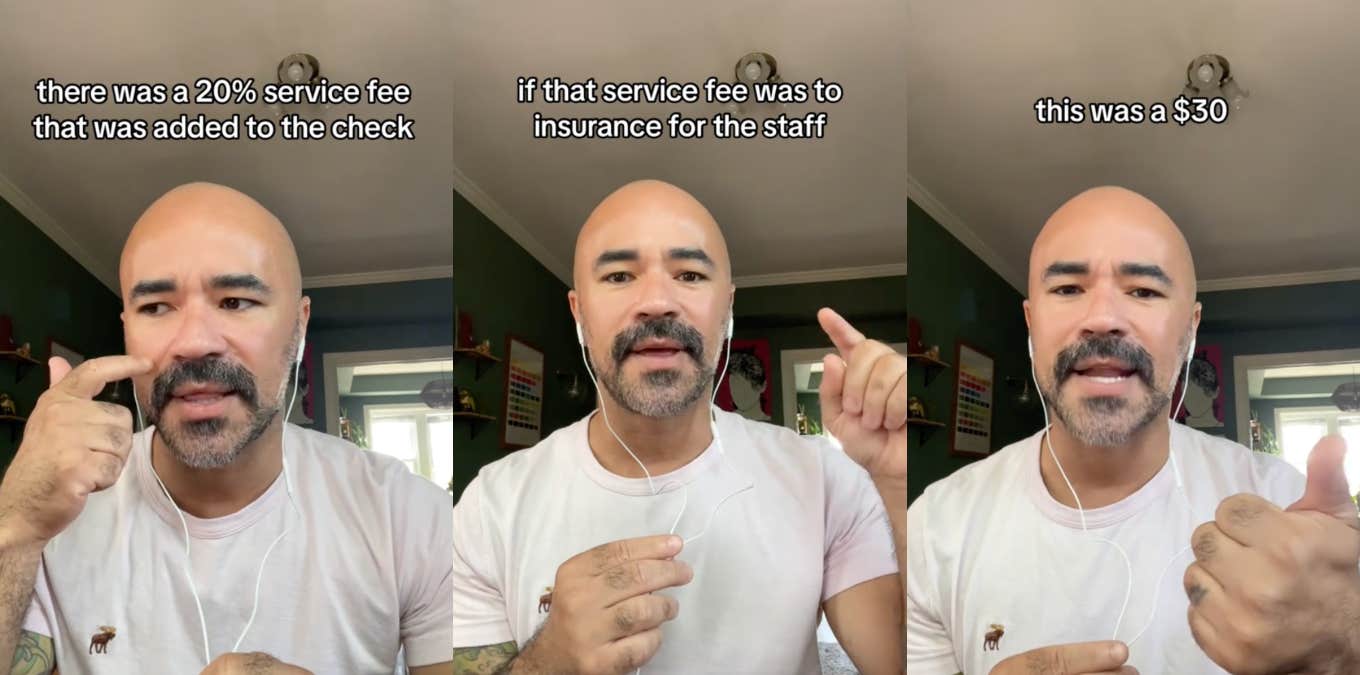Customer Says He Was Charged A 20% Service Fee & Then Asked To Leave A Tip Despite Clearing His Own Table
He pointed out that the service fee felt incredibly deceptive.
 @anotherguyjason / TikTok
@anotherguyjason / TikTok A man accused the tipping culture of getting out of hand after he was asked to pay a hefty service fee on top of leaving a tip while at a coffee shop, despite doing most of the work himself.
In a TikTok video, Jason claimed this incident happened two years ago, and is still one of the "wildest tipping experiences" he's had.
He was asked to pay a 20% 'service fee' on top of leaving a tip despite clearing his own table.
"I had a wild tipping experience a couple of years ago," Jason began in his video. "I went to a coffee shop in Chicago and on the check, once the experience ended, there was a 20% service fee that was added."
He explained that on top of the service fee, he noticed there was space for him to add 20% or more for gratuity, which confused him since there had been no service actually done at the coffee shop. He recalled sitting down and ordering from a QR code at the end of the table. Someone did bring the order, but they cleared away all of their trash and dishes once they were done.
"There was no service. Yet, there is a service fee," he pointed out. "I go to the counter once we’ve [eaten] and bussed our own table, I asked the person behind the counter, what is this service fee? They said something that was like, 'This is additional money for the staff.' I was like, 'So this is like a tip?'"
After asking if the service fee was just another version of a tip, the employee at the coffee shop begrudgingly nodded, which made Jason question why he should be expected to tip 20% on top of a service fee. He even made the argument that the entire bill was only $30 for a four-item coffee order.
He claimed that if the service fee was going toward the coffee shop workers, he would've 'gladly' paid it.
"I’m not going to tip $14 on a $30 tab when there was no service," he insisted. "It seemed deceptive. I know that some restaurants are adding a fee to help pay for insurance for their staff. Great, be transparent."
Jason acknowledged that if he was told the service fee at the coffee shop was going toward insurance for the staff, he would've gladly paid it. But that's not what he was told, and was instead given a vague answer that didn't quite make much sense.
"They were unable to articulate it [that] the moment. [At] the moment, they just said it’s another tip.”
Vague 'service fees' have become more common in the service industry.
According to a 2020 New York Times article, these types of fees and surcharges first began popping up in 2008, when an ordinance passed in San Francisco required businesses with more than 20 employees to set aside money for health care. Now, the Federal Affordable Care Act, which came two years later, requires this of employers with 50 or more employees, leaving out smaller businesses, such as restaurants and coffee shops.
Per a 2022 survey by the U.S. Bureau of Labor Statistics, only 30% of private industry workers in "accommodations and food services" have access to employer-sponsored health care.
It's clear from Jason's experience that the topic of service fees and tipping in the food service industry can be quite complex and sometimes even frustrating. It's understandable that restaurants, coffee shops, and other food service businesses would want to find ways to increase their revenue.
However, it's equally important that this pursuit is made clear and done for the right reasons, like helping employees receive health care, and doesn't come at the expense of the customers' experience and perception of fairness.
Nia Tipton is a Chicago-based entertainment, news, and lifestyle writer whose work delves into modern-day issues and experiences.
